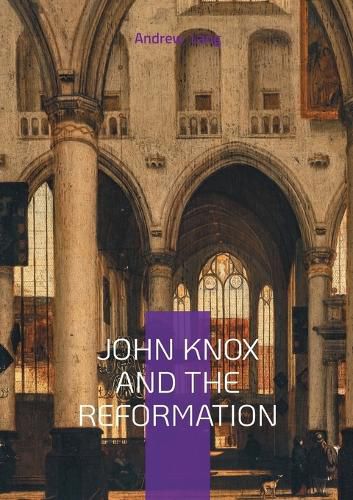Readings Newsletter
Become a Readings Member to make your shopping experience even easier.
Sign in or sign up for free!
You’re not far away from qualifying for FREE standard shipping within Australia
You’ve qualified for FREE standard shipping within Australia
The cart is loading…






This title is printed to order. This book may have been self-published. If so, we cannot guarantee the quality of the content. In the main most books will have gone through the editing process however some may not. We therefore suggest that you be aware of this before ordering this book. If in doubt check either the author or publisher’s details as we are unable to accept any returns unless they are faulty. Please contact us if you have any questions.
Andrew Langs John Knox And The Reformation delivers a rigorous examination of the Scottish cleric whose uncompromising sermons and theological polemics spearheaded Protestantisms ascendancy in 16th-century Scotland. The narrative traces Knoxs evolution from a Catholic notary to a galvanizing reformer, emphasizing his exile in Geneva under Calvins mentorship and his pivotal role in drafting the Scots Confession of 1560. Langs account juxtaposes Knoxs ideological clashes with Mary Queen of Scots against broader European Reformation currents, revealing how his First Blast of the Trumpet Against the Monstrous Regiment of Women inflamed tensions with Tudor and Stuart monarchies. Central themes include the democratization of worship through vernacular liturgy, the destruction of Catholic iconography, and the establishment of Presbyterian kirk governance. Rich in primary source analysis, the work illuminates Knoxs paradoxical legacy as both a liberator from papal authority and a divisive figure whose rigor alienated moderates. It serves as an essential resource for scholars of ecclesiastical history and Reformation-era political theory, offering nuanced insights into the interplay of faith and power in early modern Europe.
$9.00 standard shipping within Australia
FREE standard shipping within Australia for orders over $100.00
Express & International shipping calculated at checkout
This title is printed to order. This book may have been self-published. If so, we cannot guarantee the quality of the content. In the main most books will have gone through the editing process however some may not. We therefore suggest that you be aware of this before ordering this book. If in doubt check either the author or publisher’s details as we are unable to accept any returns unless they are faulty. Please contact us if you have any questions.
Andrew Langs John Knox And The Reformation delivers a rigorous examination of the Scottish cleric whose uncompromising sermons and theological polemics spearheaded Protestantisms ascendancy in 16th-century Scotland. The narrative traces Knoxs evolution from a Catholic notary to a galvanizing reformer, emphasizing his exile in Geneva under Calvins mentorship and his pivotal role in drafting the Scots Confession of 1560. Langs account juxtaposes Knoxs ideological clashes with Mary Queen of Scots against broader European Reformation currents, revealing how his First Blast of the Trumpet Against the Monstrous Regiment of Women inflamed tensions with Tudor and Stuart monarchies. Central themes include the democratization of worship through vernacular liturgy, the destruction of Catholic iconography, and the establishment of Presbyterian kirk governance. Rich in primary source analysis, the work illuminates Knoxs paradoxical legacy as both a liberator from papal authority and a divisive figure whose rigor alienated moderates. It serves as an essential resource for scholars of ecclesiastical history and Reformation-era political theory, offering nuanced insights into the interplay of faith and power in early modern Europe.